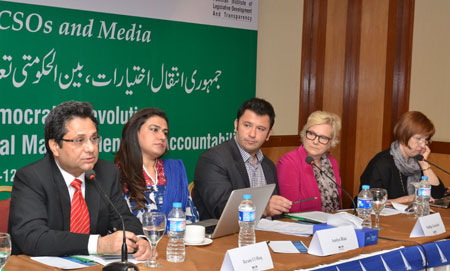|
|
| |
| EVENTS |
|
|
> Need for Equitable Distribution of Fiscal and Taxing Powers between Federation and the Provinces
|
| |
|
IGR Workshops
March 12, 2014
Karachi
|
|
| |
March 12; There is a need for equitable distribution of fiscal and taxing powers between federation and the provinces, said Dr. Ikram Ul Haq, Advocate Supreme Court and International Tax Counsel while presenting the challenges faced in the process of Fiscal Management and Accountability in Pakistan. He was addressing the second day of th?e Workshop for CSOs and Media on the subject of Consolidating Democratic Devolution: Inter-Government Relations, Fiscal Management and Accountability, organized by PILDAT and Forum of Federations, Canada that concluded in Karachi today. |
|
| |
He highlighted that Fiscal deficit is increasing, debt burden in on rise, expenses are uncontrolled, non-devolvement of fiscal responsibility can be seen and low tax-to-GDP ratio prevails. Provinces are not aware of how federation is encroaching upon their taxation rights. They have failed to understand that their right to tax gain on immovable property situated within their territories is undisputable. He suggested constitutional remedies for the improvement in Fiscal Management and Accountability process. The operation of the Constitution should be extended to FATA, PATA and other areas mentioned in Article 246, Enacting simple tax laws and rules with the aim to reducing corruption at the executive level and all exemption clauses and concessions should be removed.
|
|
| |
Dr. Galina Kurlyandskaya, Center for Fiscal Policy, Russia, speaking on Fiscal Federalism and Accountability in Federal System, shared that decentralization is the basic condition for an accountable Government. For sub national Governments to be really accountable for their performance and to respond to citizens� opinion they need to enjoy fiscal powers regarding revenues and spending. Discussing foundations of Government Accountability in Federal Countries, she suggested should be clear and long term delineation of powers, Prohibition of Federal unfunded mandates, revenue autonomy, spending autonomy, reliable and publicly accessible data and performance indicators on each level of Government. Dr. Galina further suggested that Government must be accountable for allocation of intergovernmental transfers and the transfer allocation has to be public, transparent, unbiased and fair. Government as an Executive Body has to be accountable and responsible for policies, decision and actions regarding funding, production and distribution of public goods and requires citizen�s opinion. |
|
| |
Professor Roberta Ryan, Director of the Australian Centre of Excellence for Local Government and UTS Centre for Local Government, spoke on the ways of addressing the capacity gaps to civil society participation in local government. She said that Civil Society Organizations and Government authorities must understand and make the case for the �value they claim to create�. Public participation has a role in creating public value and enabling citizen democratic capacity. She argued that critical capacity gap in Pakistan � and a key to the transition to strengthened democracy � is the key role for NGOs and this can be done through harnessing citizens through educative, deliberative participatory processes. |
|
| |
Professor Roberta Ryan concluded that the community is interested and concerned about their environment; they have good ideas about what will work in their local context. Given good quality information, citizens will produce high quality, realistic, and practical outcomes. The importance of trusting citizens� capacity to develop better outcomes for the wider community, and the similar capacity of NGOs and local government to support citizens in this role. |
|
| |
Earlier presenting the recap of day one of the Workshop, Ms. Aasiya Riaz, Joint Director PILDAT highlighted the pertinent points that the Speakers shared with the participants. |
|
| |
Following Discussion Papers were also shared among participants as backgrounder on Federalism:
Historical Evolution of Federalism in Pakistan [English Version] [Urdu Version] [Sindhi Version]
Inter-Governmental Relations in Pakistan Evolution and Potential with Relation to 18th Amendment [English Version] [Urdu Version [Sindhi Version]]
Pakistan Fiscal Management And Accountability [English Version] |
|
| |
|
|
| |
|
|
| |
|
|
| |

|
|
| |
|
|
| |

|
|
|
|
|
|
|
|
|